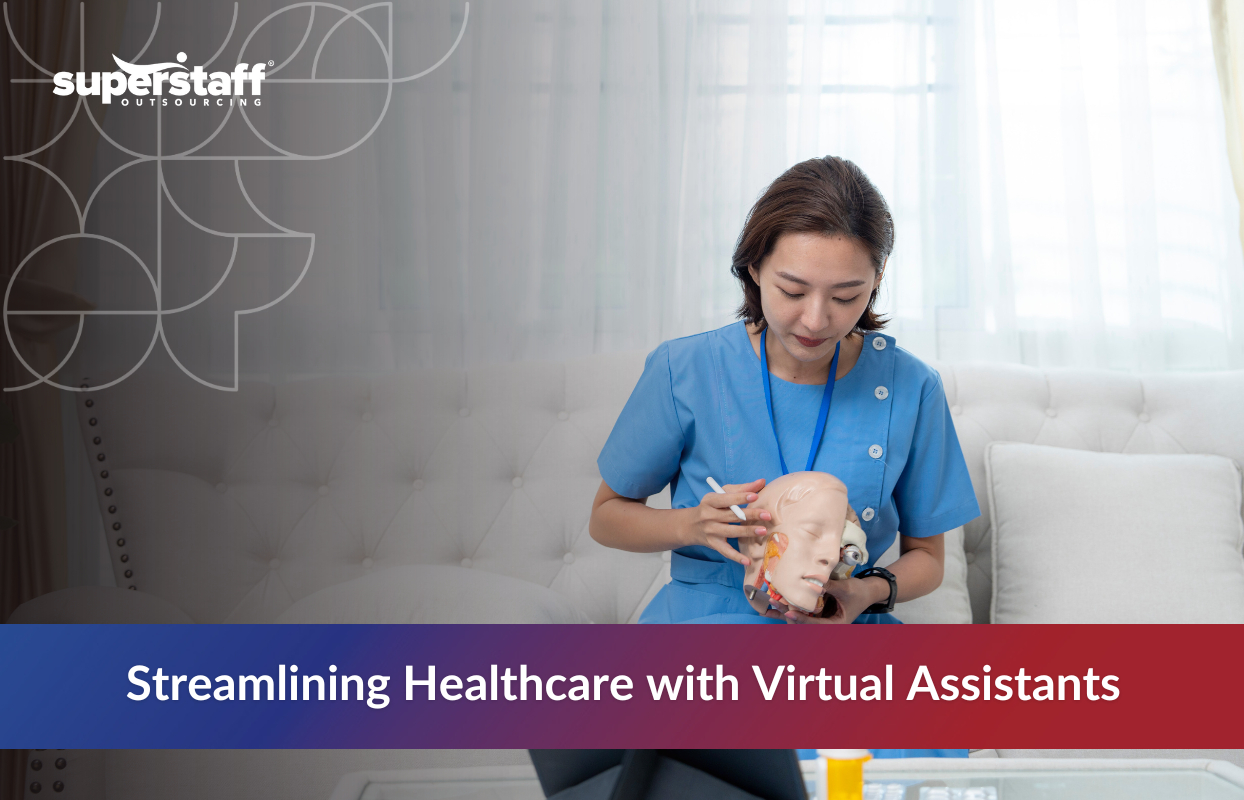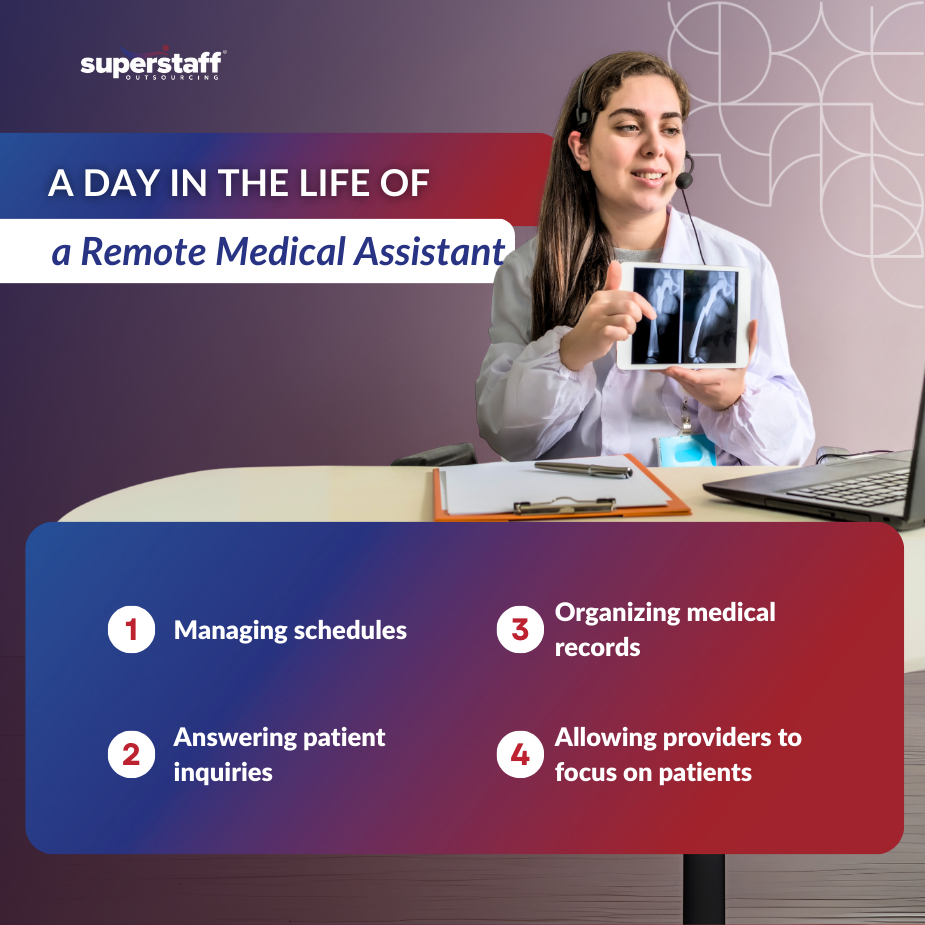
Healthcare hasn’t been the same since the pandemic. With more patients, fewer hands, and rising administrative demands, medical teams are feeling the strain. Many providers find themselves buried in paperwork, fielding endless calls, and juggling schedules—often at the cost of patient care.
Here’s how remote assistants help healthcare professionals by taking care of the details behind-the-scenes tasks so that they can focus on patient care.
From managing appointments to handling patient questions, remote medical assistants take on the time-consuming tasks that slow providers down. The result? Less burnout, faster response times, and more time for healthcare professionals to focus on what they do best—providing high-quality care.
Curious what your clinic could do with fewer admin headaches and more time for patients?

Why Healthcare Needs More Support Now Than Ever
Healthcare workers, especially those handling administrative tasks, are feeling overwhelmed. With patient numbers rising and paperwork piling up, it’s no surprise that burnout is common. A remote medical assistant helps ease this burden by managing tasks like scheduling, data entry, and patient inquiries, giving healthcare teams more time to focus on care.
-
The Strain of Administrative Tasks
Handling administrative duties like managing appointments and patient records can quickly pile up, leaving healthcare professionals with little time for direct patient care. By taking on these tasks, remote medical assistants free up valuable time for providers, helping them focus on what matters most—patient well-being.
-
Reducing Burnout through Efficient Support
Remote assistants don’t just make healthcare teams more efficient; they reduce stress by handling routine tasks that often lead to burnout. With fewer administrative burdens, medical staff can focus on delivering better care, improving their well-being, and patient outcomes.
How Remote Assistants Help Healthcare Professionals Enhance Efficiency in Healthcare Settings
Healthcare systems can easily become overwhelmed with the sheer volume of tasks that need to be completed. Remote support teams handle vital administrative duties, allowing healthcare professionals to focus on providing quality care.
Here are some of the tasks they handle:
-
Scheduling and Patient Appointments
Remote medical assistants manage patient appointments, reducing scheduling conflicts and missed appointments. This helps keep healthcare providers on track without interruptions.
-
Medical Records and Documentation
They assist in organizing and updating patient records, ensuring clinicians have the most accurate and up-to-date information available.
-
Handling Patient Inquiries
By managing inquiries, follow-up treatments, and providing basic support, remote assistants make these tasks more manageable for healthcare staff.
How does this improve efficiency?
By removing the administrative load from medical professionals, remote assistants free up valuable time. This makes healthcare operations run smoother and ensures more time is spent on patient care, rather than on tasks like managing schedules or answering calls.
Remote Medical Assistants Improve Patient Care and Satisfaction
Remote medical assistants don’t just help with administrative tasks—they directly contribute to improving patient experiences. They ensure patients have a more seamless and positive experience by taking care of scheduling and follow-up calls.
How do they impact patient care?
- Timely Follow-ups – Ensuring patients don’t miss appointments or treatments is critical. They help track and remind patients of upcoming visits, improving patient outcomes.
- Better Communication – They can handle patient questions and keep communication consistent, creating an environment where patients feel supported and heard.
- Managing Appointments – By efficiently managing appointments, they reduce delays and cancellations, leading to smoother clinic operations.
Do patients benefit from this?
A smooth and organized patient experience is essential for building trust and satisfaction. A study published found that positive patient experiences significantly enhance their willingness to seek care, highlighting the importance of trust and satisfaction in healthcare settings.
Remote medical assistants help healthcare providers deliver personalized care by efficiently managing logistics behind the scenes, ensuring patients receive the attention they need while professionals focus on high-quality treatment.
Cost-Effective Solution for Healthcare Providers
Hiring full-time, in-house staff for administrative roles can be expensive, especially when resources are tight. Virtual medical assistant services offer a more affordable approach:
- No Office Space: Remote assistants work from their own locations, eliminating the need for physical office space.
- Scalable Staffing: Healthcare providers can adjust the number of remote assistants as needed, avoiding the costs of hiring additional full-time staff.
- Lower Overhead: Without the need for office equipment or resources, remote assistants help keep overhead costs low.
By reducing operational costs without compromising care quality, remote assistants offer an attractive solution for healthcare organizations looking to optimize their budgets.
Supporting Healthcare Professionals in a Hybrid Work Environment
The healthcare industry is increasingly adopting hybrid work models, where professionals may work in both clinical and remote settings. Remote assistants seamlessly fit into these models, supporting healthcare professionals at the clinic, in the hospital, or working from home.
-
Support Across Work Environments
Whether staff are working in-person or remotely, remote medical assistants provide continuous support. They help coordinate virtual consultations and ensure seamless transitions between work settings.
-
Enhanced Flexibility
Virtual assistants offer healthcare teams the flexibility to adapt to new work dynamics, maintaining productivity and collaboration regardless of location.
-
Digital Platform Integration
Remote medical assistants integrate well with existing communication and scheduling tools, easily incorporating them into existing systems.
Adapting to hybrid work settings without losing efficiency is a key advantage for healthcare providers. They provide this flexibility, helping medical teams maintain productivity even as work environments evolve.
Ensuring Compliance and Security in Healthcare
In healthcare, safeguarding patient data is a top priority. Here are some of the key practices that ensure the security and compliance of patient data:
-
HIPAA Compliant Remote Support
In 2024, the U.S. saw over 700 data breaches, compromising 186 million records, with the majority linked to cyberattacks like ransomware. Remote medical assistants are trained to manage sensitive patient information securely.
Using encrypted platforms and adhering to strict protocols, they ensure compliance with privacy regulations such as HIPAA. Regular training and continuous monitoring keep them updated on the latest security practices, helping minimize risks and protect patient confidentiality.
-
Compliance with Regulations
They follow strict protocols to ensure that all communication and data handling comply with privacy laws and regulations.
-
Training and Monitoring
Regular training ensures that medical assistants are up-to-date on the latest security practices, while continuous monitoring mitigates potential risks.
Why is this important?
Medical assistants who are well-versed in handling confidential information provide protection, ensuring that healthcare organizations comply with all necessary regulations.
Simplify Your Workflow, Elevate Patient Care
As healthcare continues to evolve, remote medical assistants have become essential in improving efficiency, enhancing patient care, and reducing operational costs. Medical assistants provide a cost-effective, flexible, and efficient solution to meet the growing demands of modern healthcare systems.
By integrating virtual assistant services, healthcare providers can streamline operations and elevate provider and patient experiences. SuperStaff offers expert remote medical assistant services designed to help healthcare organizations reduce administrative burdens and improve overall patient care.
Our team is equipped to handle everything from scheduling and patient inquiries to managing essential tasks, allowing your team to focus on delivering quality care. Contact us today to discover how our solutions can support your healthcare facility.






